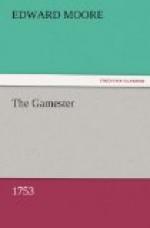A comparison of The Gamester with its predecessor, Fatal Extravagance, reflects certain developments in the intellectual background of the first half of the eighteenth century. Hill anticipated Lillo in repeating Rowe’s argument for lowering the social level of tragedy and in stating vigorously his desire to defend the stage by demonstrating its religious and moral utility. An admirer of Dennis’s critical writings, Hill repeats Dennis’s argument that the stage can affect those whom the pulpit falls to reach, and he offers his play as proof that “sound and useful instruction may be drawn from the Theatre”, challenging the enemies of the stage to test his play “by the rules of religion and virtue” (Preface). Taking a “hint”, as he says, from A Yorkshire Tragedy, Hill endeavored to show the “private sorrows” that result from gaming.
At the opening of the play, the hero, having gambled away his fortune, faces poverty. His friend who signed his bond is in jail and a kindly uncle has failed to secure the needed relief. In a fit of passion growing out of despair, the hero kills the villainous creditor, and decides to poison his (the hero’s) wife and children, and then stab himself. In his dying moments he learns that the uncle has substituted a harmless cordial for the poison and that a long-lost brother has died leaving him a fortune. This bare outline gives no indication of Hill’s careful theological rationalization of character and plot which he promised in his preface. Hill incorporated in his play the teachings of orthodox divines; there is nothing ‘revolutionary’ in his analytical presentation of human nature. The theological significance of Hill’s play has not, to my knowledge, been recognized; thematic passages tend to be dismissed as tiresome and gratuitous moralizing and the plot is often regarded as empty melodrama or the representation of some ambiguous ‘fate’. It is in this deliberate theological rationalization of his materials that Hill owes most to Mrs. Trotter’s domestic tragedy and that he differs significantly from Moore.
As with Hill and Lillo, Moore’s desire to write a play with an extensively useful ‘moral’ led him to middle-class realism and prose. To attack the widespread fashion of gaming which he regarded as a “vice”, Moore attempted to present “a natural picture” in language adapted “to the capacities and feelings of every part of the audience” (Preface, 1756). That he should have treated this social problem tragically is to be explained, perhaps, by his sources and by his religious background. He justified the “horror of its catastrophe” on the grounds that “so prevailing and destructive a vice as Gaming” warranted it. The Gamester has been justly credited with superior dramatic qualities in comparison with Hill’s Fatal Extravagance,, but we might perhaps note briefly certain aspects of the two plays which reflect changes in the intellectual background. In both plays theological ideas are involved in the treatment of the fall of the hero, partially in Moore’s play, completely In Hill’s. Not recognizing ideas common to early eighteenth century sermons, the modern reader may perhaps puzzle over the steadily increasing moral paralysis and despondency in Moore’s hero, Beverly. Vice, preached the divines, beclouds the reason, leaving it progressively incapable of controlling the passions:




